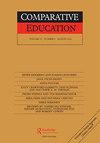Taiwanese multiculturalism and the political appropriation of new immigrants’ languages
IF 3.7
1区 教育学
Q1 EDUCATION & EDUCATIONAL RESEARCH
引用次数: 5
Abstract
ABSTRACT Since 2019, Taiwan has implemented native language education for ‘new immigrants’ from Southeast Asian countries. This paper argues that the new educational provisions reflect the Taiwanese government’s desire to appropriate new immigrants’ cultures and languages to promote a multicultural vision of Taiwanese identity. It analyses the 12-year national curriculum guidelines and the primary-level teaching materials to elucidate the role of language education in the construction of discourse on new immigrants, exploring how this reflects and reinforces official portrayals of Taiwanese society as ‘multicultural’. The analysis shows how the extension of curricular recognition to immigrants’ languages and their associated cultures is driven by a desire to project a certain vision of mainstream national identity. By showing how, in the Taiwanese context, instruction in their languages in some respects reinforces the marginalisation of immigrant communities, it provides insights that may be applicable elsewhere.台湾多元文化主义与新移民语言的政治挪用
自2019年起,台湾开始针对东南亚“新移民”实施母语教育。本文认为,新的教育规定反映了台湾政府希望利用新移民的文化和语言来促进台湾认同的多元文化视野。本研究透过分析十二年国定课程大纲及小学教材,阐明语言教育在新移民话语建构中的角色,探讨语言教育如何反映及强化官方对台湾社会“多元文化”的描述。分析表明,对移民语言及其相关文化的课程认可的延伸是如何被一种投射主流民族认同的愿望所驱动的。通过展示在台湾的背景下,他们的语言教学如何在某些方面加强了移民社区的边缘化,它提供了可能适用于其他地方的见解。
本文章由计算机程序翻译,如有差异,请以英文原文为准。
求助全文
约1分钟内获得全文
求助全文
来源期刊

Comparative Education
EDUCATION & EDUCATIONAL RESEARCH-
CiteScore
7.40
自引率
21.20%
发文量
35
期刊介绍:
This international journal of educational studies presents up-to-date information with analyses of significant problems and trends throughout the world. Comparative Education engages with challenging theoretical and methodological issues - and also considers the implications of comparative studies for the formation and implementation of policies - not only in education but in social, national and international development. Thus it welcomes contributions from associated disciplines in the fields of government, management, sociology - and indeed technology and communications - as these affect educational research and policy decisions.
 求助内容:
求助内容: 应助结果提醒方式:
应助结果提醒方式:


